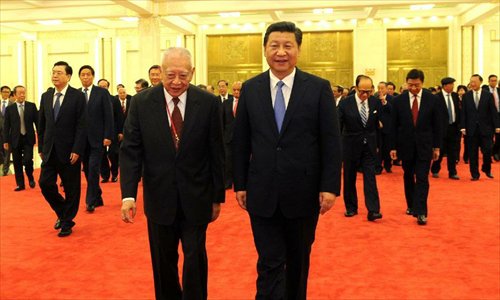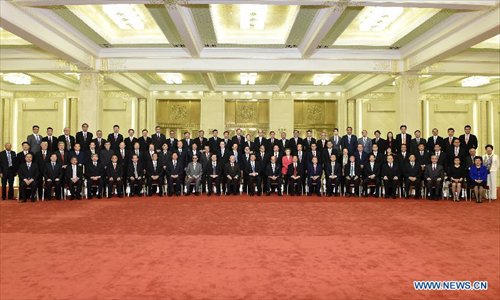No change in HK policy: Xi
President meets 70 SAR business leaders in Beijing

Chinese President Xi Jinping(R front) meets with a delegation of Hong Kong's industrial and business circles headed by Tung Chee-hwa(L front) in Beijing, capital of China, Sept. 22, 2014. Photo: Xinhua
Chinese President Xi Jinping reiterated the need to uphold "One Country, Two Systems" while meeting with a 70-strong Hong Kong delegation of top business leaders led by the city's former chief executive Tung Chee-hwa on Monday afternoon.
He stressed that "One Country, Two Systems" is basic State policy, and that continuing to put the policy into practice is the common wish of all Chinese people, including those in Hong Kong.
"The central government's basic principle and policy toward Hong Kong have not changed and will not change," the Xinhua News Agency quoted Xi as saying at the meeting.
"The key is to fully and accurately understand and implement the 'One Country, Two Systems' principle, and to uphold the authoritative status of the Basic Law," Xi stressed.

Chinese President Xi Jinping meets with a delegation of Hong Kong's industrial and business circles headed by Tung Chee-hwa in Beijing, capital of China, Sept. 22, 2014. Photo: Xinhua
The delegation, made up of tycoons with businesses spanning real estate, banking and manufacturing, was led by former Hong Kong chief executive Tung Chee-hwa, who is now a vice-chairman of the National Committee of the Chinese People's Political Consultative Conference.
Xi expressed his approval for the contributions the business sector has made to the stability and prosperity of Hong Kong society, and urged the territory to unite for the common goal of creating a better future for Hong Kong and the nation.
The trip was arranged following the National People's Congress (NPC) adoption of a framework for election of the city's 2017 chief executive by universal suffrage, and against the backdrop of an Occupy Central campaign that claims the election will exclude "democratic" candidates. Occupy Central has said it will protest the framework through mass sit-ins designed to shut down Hong Kong's financial district.
Business leaders have condemned Occupy Central's plan, saying it will threaten the city's status as an international financial center.
One of the tycoons, Henderson Land Development chairman Lee Shau-kee, urged Hong Kong to make gradual, orderly progress by moving forward with the NPC's reform plan. He warned that Occupy Central will cause Hong Kong to lose its edge as a competitive business hub, according to Hong Kong broadcaster RTHK.
"Xi's meeting with the Hong Kong business leaders' delegation has proven that the central government's policy toward Hong Kong has remained unchanged, and shown China's dedication to Hong Kong's long-term stability and prosperity," Qiang Shigong, a Peking University professor and expert in Hong Kong issues, told the Global Times.
"There has been misconception that China's Hong Kong policy has changed after the release of the white paper," said Qiang, who believed the meeting will help correct this misunderstanding.
Another Hong Kong business mogul, Lui Che-woo, chairman of the K Wah Group and founder of the Galaxy Entertainment Group, called on democracy activists to be "constructive."
"I have been striving [for Hong Kong's development] for more than 70 years. Hong Kong has earned a global reputation as a model city … [The activists] should work for Hong Kong's economic development … If people are unhappy, just speak out. Don't ruin Hong Kong," Lui was quoted as saying by RTHK.
The delegation includes some of the city's wealthiest business leaders, including Cheung Kong (Holdings) and Hutchison Whampoa chairman Li Ka-shing; New World Development chairman Henry Cheng Kar-shun; Wharf Holdings chairman Peter Woo Kwong-ching and CLP Holdings chairman Michael Kadoorie.
Their companies alone boast combined net assets of HK$1.75 trillion ($226 billion), reported the South China Morning Post.
On September 16, Zhang Dejiang, chairman of the NPC Standing Committee, met with a visiting delegation of the Hong Kong Federation of Trade Unions headed by its president Lam Shuk-yee. Zhang said he hoped the federation would hold on to its principles of patriotism and loving Hong Kong. The central government supports the lawful and steady development of democracy in Hong Kong, Zhang said.